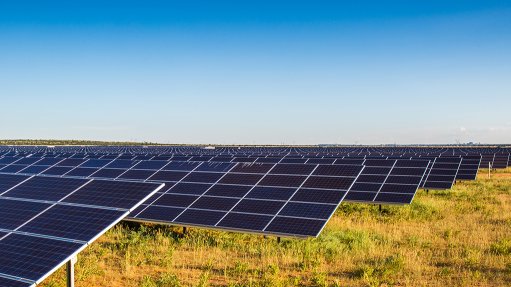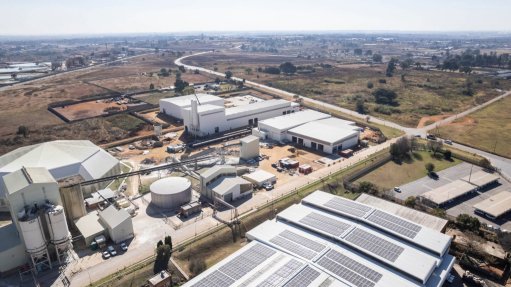Depressed market causes company to revert to offshore work
Designer and supplier of high-capacity electric submerged-arc smelting furnaces and complete smelting plants for the production of ferroalloys, base metals, slag cleaning and alloy refining Tenova Pyromet’s international presence means it is less affected by the depressed market in South Africa. The lower percentage of local projects is compensated by the company’s portfolio of overseas projects.
“Although the market is depressed in terms of new capacity being added, the aftermarket division of our company is still active in South Africa. We assist our clients, even after the warranty period, with maintenance, spares and advice. South Africa is also active in terms of potential projects, where studies are being carried out,” says Tenova Pyromet MD Chris Oertel.
He notes that the company’s international work is carried out in many countries and is not concentrated on one particular area, although most of the growth and new capacity is taking place in China and the rest of South-East Asia.
“We have done work for clients in South- East Asia, Russia, Kazakhstan, Australia, Europe and North and South America,” Oertel says.
Examples of overseas projects recently completed by the company include a project for mining company Norilsk Nickel, in Siberia.
Tenova Pyromet, which is part of the Tenova Mining & Minerals group, was selected in 2008 by Norilsk Nickel for the upgrade of two of its
63 MVA nickel slag-cleaning furnaces at its Nadeshdinsky metallurgical plant.
The contract involved the development of project documentation, the supply of equip- ment, the supervision of erection and commissioning, as well as equipment and performance guarantees.
“The upgrade called for the increase of the diameter and power input of the furnaces, which recover nickel, cobalt and copper from the flash furnace and converter slag streams to allow the processing of about 2 400 t/d of slag for each furnace.
“The furnace power rating also had to be increased to 30 MVA, with a maximum power input of 25 MW, depending on process requirements and conditions. The first slag-cleaning furnace came on line in October 2011, while the second came on line in December 2012,” says Oertel, noting that the company is finalising arrangements to carry out the performance tests on the second furnace.
He says the language difference was a challenge during the design phase, which the company addressed through its Moscow office.
“We employed Russian-speaking engineers to work on and supervise the project. We also had a translator who assisted with the translation of all documents into Russian,” Oertel says.
Conditions in Siberia also posed a challenge for Tenova Pyromet, which had to ship all the equipment in summer, as the access rivers freeze in winter.
“The equipment also had to be specially packaged to withstand the temperatures, which can drop to –45 °C,” he notes.
Oertel adds that the company provided the client with training on the operation and maintenance of equipment and is providing spares for the company for two years, as part of the contract.
“The plant is isolated, so the client required spares on site,” he explains.
Tenova Pyromet was also involved in a project for Australian silicon producer Simcoa Operations at its plant in Bunbury.
The project, which began in December 2009 and was completed in September last year, involved the manufacturing and installation of a 24 MW silicon metal furnace, including a bag filter plant.
“Owing to the high labour costs in Australia, we manufactured all the equipment offshore and shipped it, as the plant was close to a harbour. “Most of the fabrication was done in China. “Even the furnace shell, which is usually assembled on site, was completely manufactured in China. “It measured 9 m wide by 5 m high and weighed about 100 t.
“We managed to secure the contract ahead of our European competitors, who had built the two existing smaller furnaces on the plant,” says Oertel.
The company is in the final stages of the agreement for the performance certificate.
He notes that this project also posed some challenges for Tenova Pyromet.
“Australian quality regulations are extremely stringent, which means that we had to ensure that our work met their standards. “The technology is also a challenge, as companies will mostly use local suppliers, unless you offer them something unique in terms of quality and technology.
“We cannot compete with companies from China on price, so we have to ensure that we stay ahead in terms of technology, mainly in improving efficiencies, power consumption and environmental impact,” Oertel explains.
South African Projects
Locally, the company has been involved in projects for platinum miner Lonmin and global diversified miner Xstrata.
Lonmin’s Furnace 2, near Rustenburg, in South Africa’s Bushveld Complex, was rebuilt by Tenova Pyromet and met its performance guarantees during normal operation, elimin- ating the need for a formal per- formance test.
Consequently, Lonmin signed the performance certificate for the circular furnace in March this year.
“Following the award of the contract to Tenova Pyromet in October 2010 to design and manufacture the primary plati-num smelting furnace, power was switched on in June 2012 and was steadily increased to 7 MW in August, when labour unrest forced operation at reduced power.
“No damage was caused to the furnace during this extended period and power was increased smoothly to reach full power thereafter, reaching the rated furnace power of 10 MW in February this year,” explains Oertel.
The project involved replacing a rectangular furnace with a circular, alternating-current furnace.
“Such a furnace is more suited to Lonmin’s high chromite-containing platinum group metals concentrates. “The contract covered the provision of the electrodes, furnace shell, cooling systems, tapping equipment, feed system, exhaust gas handling and control systems,” he states.
Oertel says the challenges were the quality of local contractors and having limited time towards the end of the project. The company faced these challenges through the supervision of the contractors and working extra shifts to ensure the project was delivered on time.
Tenova Pyromet is currently in the fabrication phase of its project for Xstrata as part of the expansion to its Lion ferrochrome operation, in Steelpoort, Limpopo, where it is building two 75 MVA furnaces.
“We also built the other two furnaces at the plant and will deliver the final equipment for the new furnaces during the next few months, in time for construction. We will be involved in on-site supervision during the construction phase,” says Oertel.
He adds that the company faced challenges with regard to local fabrication.
“We decided to manufacture some of the equipment locally, which we would usually manufacture overseas. “We did experience delays, as it was the first time that the supplier had manufactured some of this equipment, so we assisted them to ensure the quality was acceptable,” he explains.
Future Plans
Looking forward, Oertel hopes the global slowdown in new capacity will come to an end in the next six to twelve months.
“Until then, we have to focus on current market demands, including improving efficiencies and power consumption.”
He notes that Tenova Pyromet has been developing its multiple preheater technology during the past three years, which is now being introduced onto the market. This can be retrofitted to existing furnaces and offers a lower capital cost than existing technologies.
“The multiple preheaters use furnace offgas to heat the raw material feed for ferroalloy furnaces, which means efficiencies are improved and the power needed to produce each ton of product is reduced, increasing production. “This is more effective use of the offgas energy than gener- ating electricity,” Oertel explains.
He adds that the company is also developing various other technologies to meet market needs.
“We are also looking to enter new markets or to enter markets in which we are less active. This will require the acquisition and development of new technologies.
“An example of a market where we want to increase our product range is primary copper smelting, which is a growing area of interest worldwide.
“Further, we hope to get more interaction from our network of businesses within the group,” Oertel concludes.
Article Enquiry
Email Article
Save Article
Feedback
To advertise email advertising@creamermedia.co.za or click here
Comments
Press Office
Announcements
What's On
Subscribe to improve your user experience...
Option 1 (equivalent of R125 a month):
Receive a weekly copy of Creamer Media's Engineering News & Mining Weekly magazine
(print copy for those in South Africa and e-magazine for those outside of South Africa)
Receive daily email newsletters
Access to full search results
Access archive of magazine back copies
Access to Projects in Progress
Access to ONE Research Report of your choice in PDF format
Option 2 (equivalent of R375 a month):
All benefits from Option 1
PLUS
Access to Creamer Media's Research Channel Africa for ALL Research Reports, in PDF format, on various industrial and mining sectors
including Electricity; Water; Energy Transition; Hydrogen; Roads, Rail and Ports; Coal; Gold; Platinum; Battery Metals; etc.
Already a subscriber?
Forgotten your password?
Receive weekly copy of Creamer Media's Engineering News & Mining Weekly magazine (print copy for those in South Africa and e-magazine for those outside of South Africa)
➕
Recieve daily email newsletters
➕
Access to full search results
➕
Access archive of magazine back copies
➕
Access to Projects in Progress
➕
Access to ONE Research Report of your choice in PDF format
RESEARCH CHANNEL AFRICA
R4500 (equivalent of R375 a month)
SUBSCRIBEAll benefits from Option 1
➕
Access to Creamer Media's Research Channel Africa for ALL Research Reports on various industrial and mining sectors, in PDF format, including on:
Electricity
➕
Water
➕
Energy Transition
➕
Hydrogen
➕
Roads, Rail and Ports
➕
Coal
➕
Gold
➕
Platinum
➕
Battery Metals
➕
etc.
Receive all benefits from Option 1 or Option 2 delivered to numerous people at your company
➕
Multiple User names and Passwords for simultaneous log-ins
➕
Intranet integration access to all in your organisation


















